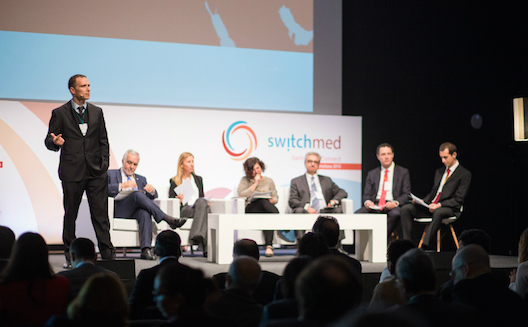Eco and social entrepreneurs meet in Barcelona


Enrique de Villamore Martín, director of SCP/RAC, speaks at the
the SwitchMed networking panel. (Images via
SwitchMed)
More than 400 stakeholders in the Mediterranean region’s environment and economy met recently at the Centre de Cultura Contemporània de Barcelon in Barcelona to network, exchange knowledge and collaborate on social and ecological innovations.
SwitchMed Connect 2015 brought together entrepreneurs in sustainable tourism, food, mobility, fashion, and housing, and those who work for support entities in public policy, financing, training and open innovation platforms.
Living in countries with resources challenges, these entrepreneurs are seen as the ones able to lead their communities towards more sustainable business practices, build “green” economies with enormous business potential, and help resolve serious issues like water scarcity, non-sustainable energy sources, climate change, land degradation, waste management and the increasing environmental pressures caused by the refugee crisis.
The first day focused on meeting these “switchers” at the Switchers Expo. Focus on the second day was on scaling up innovation.
“SwitchMed Connect was a great platform to meet and network with other like-minded people in the Mediterranean region in the field of sustainable tourism,” said Nabil Tarazi, founder of Eco-hotels, Jordan.
Raising consumer awareness about the impact of their purchasing habits is crucial, according to Mohamed Salama, founder of Kutuno, a Spanish clothing brand that uses 100 percent organic cotton.
"It's a matter of commitment,” he said. “People have to wonder about the impact of what they are consuming."
Eco-friendly startups face many of the challenges that other startups face.
Patrick El Zoghbi, cofounder and general manager of Vea said he has two main challenges: creating a “homogenous team of employees and external expertize network”, the second is funding.
Karim Sokhn, founder and manager of Deghri, a Beirut-based bicycle messenger service, said it takes time to build credibility.
“Not enough experience with business management [...] leads to several management problems [like] team management, financials, et cetera,” he wrote in an email to Wamda.
SwitchMed’s scale-up sessions focused on market pull, access to finance, market links, business models, policy links, and technical support. Region-specific initiatives such as a Mediterranean open innovation platform and a green impact investing network were also discussed.

SwitchMed 2015 activities were hands-on.
The donor and lender community was there as well.
"We, as lenders/donors, have learned more about the problems faced by entrepreneurs and should use this to adjust and improve our funding mechanisms and approach,” said Nicola Di Pietrantonio, Programme Manager, EU Directorate-General for Neighbourhood and Enlargement Negotiations.
SwitchMed also seeks to support and localize eco and social innovation in the Mediterranean countries through its Training of Trainers (ToT) program on green entrepreneurship models and tools.
Selected professionals went through the ToT course over the past few months in Algeria, Tunisia, Morocco, Lebanon, Jordan, Palestine and Egypt, and are ready to provide training to entrepreneurs.
What did entrepreneurs get out of SwitchMed Connect that they can apply in their work?
Zoghbi said the connections he made and the motivating case studies were very helpful.
For Sokhn, the experience reinforced the importance of communicating his startup’s value efficiently, and the overall benefits of online outreach and marketing.
With so much momentum and enthusiasm at the event, one question comes to mind: can ecological and social innovations provide solutions for the Mediterranean region? We hope so.


